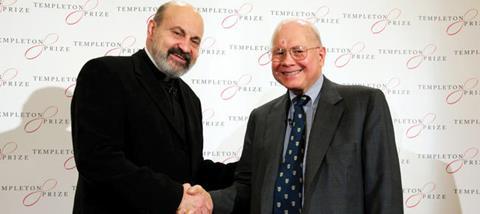
Monsignor Professor Tomáš Halík, 65, a Catholic priest and philosopher, is the 44th recipient of the award given for contribution to spiritual progress. Previous recipients include Desmond Tutu, the Dalai Lama, Billy Graham and Mother Teresa.
In an interview with Premier Christianity, Monsignor Halík, who is committed to engaging in dialogue with people of different beliefs and cultural traditions, said he received the award on behalf of his teachers, many of whom suffered under the Soviet regime. ‘I perceive it as an honour, not only for me but for my teachers – for the people that inspired me,’ he said.
‘Many of them spent many years in Communist prisons, and they had little opportunity to write and publish. They bore a cross, and I now can experience the Easter morning – the restoration of freedom,’ he added.
In 1972 Halík was condemned by his nation’s government as an ‘enemy of the regime’. He spent nearly two decades organising an extensive secret network of academics, theologians and students.
During this time he developed important pastoral relationships with a number of liberation leaders. Among these were Václav Havel and Cardinal František Tomášek, who helped Czechoslovakia transition to democracy following the Velvet Revolution of 1989.
Halík spoke of the need for people of faith to influence society by their words and deeds. ‘I think our world needs people who not only speak about spirituality, but live it,’ he said. ‘A good example is Pope Francis, who is really a spiritual man and who became very quickly a moral authority not only for Catholics and not only for believers.
‘If spiritual men are living [in a way that] is an incarnation of the values of the gospel, they have some strength and can be very influential.
‘I don’t think the Church should be a power, but it should be a prophetic voice; a very clear voice, a very competent partner for dialogue in discussions about the key questions of our world.’
Halík has advocated the importance of interfaith dialogue and religious tolerance in his writings and lectures, both as professor of sociology of religion at Charles University, Prague, and in his work with the Czech Christian Academy.
He plans to use the prize money to continue this work. Halík will be formally awarded the prize at a ceremony in London in May.
The award poses a series of big questions, which Halík answers on the award website. This year’s questions include whether the evil in the world proves there is no God, and whether God is an answer or a question.



























